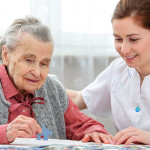
Are you worried that your older adult with Dementia is unable to recognise you? Do you feel sad that your loving granny doesn’t remember your name? Watching the cognitive decline of an older one with Dementia is heartbreaking. Once it starts affecting your relationship, it leaves you miserable and sad. In the middle and later stages of Alzheimer’s disease, people tend to lose the ability to recognise and remember others. Sometimes it gets limited to recalling the name of the family members, and at other times it can be challenging to recall the exact relationship. Along with forgetfulness, people tend to get anxious, agitated and have symptoms of delusions, combativeness and paranoia.
Why Your Older Adult Can’t Recognise You?
Do you question why your older adult is unable to recognise you? There are many reasons behind it like memory loss, paranoia and delusions, delirium and vision loss.
Memory Loss: Alzheimer’s damages the brain and affects the memory. Depending on which area of the brain gets damaged, the facial recognition, ability to recall names, relationships and events can get affected. So, it is mainly this change in the mind that impacts your loved one’s ability to recognise you.
Paranoia and Delusions: Along with changes in the brain, there are psychological changes that take place causing, Dementia and paranoia. Irrational thoughts and feelings develop that causes your elderly to fear or mistrust you.
Delirium: Besides, in some cases, if the inability to recognise you is sudden, then it is possible that your elderly is suffering from some infection, which is causing delirium. In such a situation, you should contact the physician.
Vision Loss: Yet another reason behind their inability to recognise you is the loss of vision. Sometimes, a person with Dementia experiences decline in vision that goes unnoticed.
Ways of Dealing & Coping
When your older adult doesn’t recognise you, it can get heart-wrenching. However, it is not deliberate, and you need to look for ways to deal with it. Below are some of the ways you can cope with it and assimilate yourself.
Acknowledge the Loss: It is essential that you accept the situation and get over the grieving process. You will get emotional, and it is reasonable too. However, try to be accepting, loving and gentle with your elderly. Losing your calm is the worst thing you can do to yourself and your older adult. So, grieve over your loss with your loved ones and stay calm in front of your elderly.
Talk & Remind: Adopting a Stoical approach will not be the right. Instead, it will help if you keep the channel of communication open. Talk to your elderly and try to remind them of your name and your relationship with your older adult.
Blame the Disease Not the Person: You need to prepare yourself and stay strong. Each time your elderly forgets you or recalls the name of someone else in the family and not you, you should blame the disease. It is essential that you don’t take any of these episodes personally.
Respond Gently: When your loved one doesn’t remember you or acts indifferent, you should still respond gently. If you end up reacting, it will make them anxious. It will help if you distract them or end such a conversation and decrease their worries.
Photos & Videos: To make this phase easy for yourself and your older adult, show them pictures and videos of your family and friends. If you make it a habit, you never know when your elderly surprises you by recalling some event or family member.
Engagement is Essential: During this stage of Dementia too, it is essential that you engage the elderly. You can ask them to do whatever chores they like. If they want to fold clothes or help put the vegetables and grocery, let them do it and feel happy. You can also sit with them and read or play some easy and engaging games.
Along with the above tips, if you feel the need of consulting a seasoned professional, then Samvedna Senior Care team is only a phone call away. The team at Samvedna specialises in Dementia Care. We offer Cognitive Assessments, Home Care programs, Group Programs and Caregiver Support. Under the Cognitive Assessments program, there are memory assessments, and neuropsychological evaluations carried out by clinical psychologists and mental health specialists. The Home Care program is an individualised care plan developed for your elderly according to the assessment report and neurologists’ feedback. If your elderly feels embarrassed and doesn’t socialise, then the Group Program can help.
With your older adult, you the carer also needs care. For this, we have the Caregiver Support program. You can know more about the Dementia Care services by Samvedna Care. Together we can help you and your older adult sail through this challenging phase effectively and gently.
from Samvedna Senior Care https://ift.tt/2SQmFSH
via IFTTT
Comments
Post a Comment